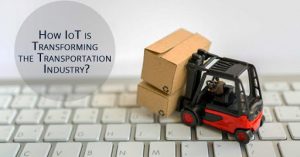IoT is transforming transportation industry
Older vehicles are being replaced with ‘smart trucks’, using Machine-to-Machine (M2M) / Internet of Things (IoT) systems and cellular communications technologies to transmit essential information for management of today’s fleet operations.
By Rishi Bhatnagar- With the world advancing towards the concept of smart cities, Internet of Things has undoubtedly become one of the main drivers for large businesses to grow. Already making a significant impact on various businesses, IoT is set to continue to steer innovation and development throughout the fleet management industry.
The global trucking industry is undergoing enormous change. Older vehicles are being replaced with ‘smart trucks’, using Machine-to-Machine (M2M) / Internet of Things (IoT) systems and cellular communications technologies to transmit essential information for management of today’s fleet operations. By combining IoT with artificial intelligence, big data, and predictive analytics, IoT has the power to revolutionize the fleet management industry.
IoT in intelligent transportation can not only assist in improving road safety but can also help the world by easing traffic congestion and averting road accidents. It can also enhance the fleet management operations by effective fares collection and can also help in gaining useful insights about commuters’ preferences and behavior.
Real-time data access
Do your drivers make unnecessary stops on their way for delivery? Do they keep the engine switched on for longer which results in wastage of fuel? This might not seem big of an issue, but when it is looked at from a business point of view, these little stoppages can cost a lot.
With high-quality sensors installed in the vehicles, fleet owners can gather all these real-time data, which will help them optimize efficiencies and their business processes. For example, sensors can help the fleet manager get unprecedented level of insight like measure pressure levels of vehicle tires, location of their vehicle and the driver.
Also, sensors attached to vehicles can help owners detect their driver’s behavior, giving them information about driving quality, compliance with speed regulations, route adherence, acceleration and deceleration statistics, braking practices, and more. As a result, with the fleet management IoT solution, managers can leverage real-time information to efficiently organize and direct the day-to-day operations of their fleet services.
A connected mobility
As the IoT gains more pace, fleet-based activities will continue to become more advanced. Fleet yards/stations will be able to manage incoming and outgoing vehicles more efficiently and easily. As fleet management IoT solution enables proactive monitoring of all the sensors and later analyze the collected data there will be smoother fleet handling, as the data gathered will provide the insights. Additionally, managers will be able to keep a track of the fuel consumption – for example on shorter or less intensive routes.
Connected fleets improves operational efficiency and less environmental impact
Connected trucks enable a more efficient, productive enterprise while simultaneously reducing environmental impact. It reduces the vehicles travel to the site by 68% which lowers fuel consumption, emissions and minimize carbon footprint.Also, it helps to reduce Co2 emissions by 75% per year which equals 36 million metric tons per year making it environmental friendly too.
When connected to cloud, the risk of accidents/injuries due to careless driving and less connectivity will be reduced by 25% which will increase the vehicle’s efficiency by 15%. Moreover, the improvement in accidents will also manage to reduce the materials wasted on road due to accidents by 15% decreasing the cost of managing the logistics.
Access to preventative maintenance
Along with getting better insight into driver’s behaviour, connectivity to every vehicle also let you monitor the health of the fleet from any device. With on-time alerts for services like battery low, coolant temperature, engine maintenance, inspection reminders and other factors, one can receive the preventative measures to keep the vehicles running safely and smoothly for longer. Consequently, fleet managers will increasingly monitor these operational parameters and take immediate measures to predict mechanical problems before they even occur.
Fleet management connected device’s number worldwide is expected to grow to 60 million by 2023 from 11 million devices in 2013. Also,statistics suggests that the global connected fleet market is expected to grow from $12.56 billion in 2014 to $35.35 billion in 2019.
The future will see more fleet managers manage and control their assets with IoT solutions, ensuring enhanced customer satisfaction, improved safety, and greater business efficiencies. No doubt, IoT is the future for fleet management, fleet owners will have many choices, but it is necessary that they opt the fleet options from an appropriate IoT vendor.
Source: http://bit.ly/2JDWhXd





Recent Comments